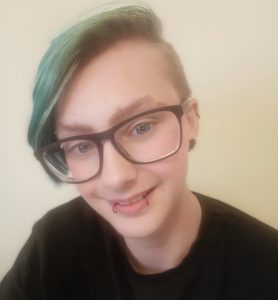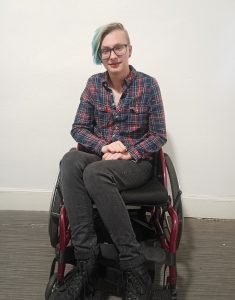Introduced to cannabis while struggling with symptoms of Ehlers Danlos syndromes as a teenager, getting a prescription has allowed Lex Wolfe to plan for the future and thrive while living with multiple chronic health conditions.
Lex Wolfe has just graduated from an undergraduate degree in forensic science.
Now considering a Masters in biochemistry, this was unimaginable to their teenage self, who just a few years ago was struggling to make it through GCSE exams.
“I thought I wasn’t going to make it past high school in terms of education, I barely survived my GCSEs. Although I got good grades, it was exhausting,” says the 21-year-old.
“I didn’t think about whether I would go to sixth form or actually what I was going to do after school, I just needed to find a way of living that was comfortable.”
After being diagnosed with autism spectrum disorder and depression and anxiety as a child, the classroom environment combined with symptoms of social anxiety meant that Lex struggled in school. But as a teenager they began experiencing physical symptoms too.
“I started to notice that I was in quite a lot of pain – I shouldn’t have been in that much pain, it wasn’t normal,” they say.
“At the time I had hundreds and hundreds of trips to see doctors and other healthcare professionals but nobody could figure out what was wrong because I seemed to have a weird collection of symptoms.”
Lex says they tried everything for pain relief and was prescribed “hundreds” of pharmaceutical painkillers.
“I was told it was growing pains, I was told that I was just being pathetic, that it was just normal aches and pains and I would grow out of it,” they add.
“They thought my pain might have been psychological.”
At the age of 15, Lex’s mum revealed she also lived with chronic pain. And she had been consuming cannabis for years to help with the symptoms.
“It was my mum who first introduced me to cannabis,” says Lex.
“She turned around to me and said, ‘by the way, you’re not the only one with chronic pain – I struggle with it too’.”
“It was kind of a revelation, I felt relieved that I wasn’t the only one.”
Lex began accessing cannabis and says they “haven’t looked back” since.

“The first thing I noticed was that my anxiety levels were massively reduced. I was actually able to talk to people – if I wasn’t medicating this conversation wouldn’t be happening right now,” they say.
“I didn’t notice pain relief to begin with, it wasn’t until a couple of months later, when I decided not to take my prescription painkillers and see what happened.
“It doesn’t remove my pain completely but it’s now at a level that is easy enough for me to manage. I can continue with life like a normal human being, whilst also not rattling because I’m full of pharmaceutical drugs.”
Lex’s family were always supportive, but they kept it a secret from school friends.
“I’d heard about how it was a bad drug, the typical stuff they tell you in school, but that kind of thing was never mentioned in my family, it was always just seen as a medicine,” they say.
“Even still, it was something I was always told to keep secret, because you don’t know how other people will react to it.”
When their friends discovered cannabis for themselves and began using it recreationally, Lex revealed that they had been consuming it medicinally for years.
“Although they found it a fun drug for the weekend, it was something I needed to live a decent life,” says Lex.
“My friends understood, to a certain degree, a lot of them had generalised anxiety and did experience some relief themselves, but the rest of the population just labelled me as a ‘stoner’.”
Lex was eventually diagnosed with Ehlers Danlos syndromes in 2018, nine years after the initial symptoms had begun.
They asked their GP about the possibility of accessing cannabis on prescription, but were told as it was not available on the NHS there was no way of getting it.
“I knew I would clearly qualify for it and I asked if there was any way it would be available to me and was told no,” they explain.
“It wasn’t until I got so annoyed at the fact that I was buying off the black market and being put in an awkward position, that I started exploring whether I could find someone whom I could pay to prescribe it.”
Lex was eventually taken on as a patient at a private clinic in the UK and shortly afterwards was introduced to the patient-led organisation PLEA (Patient-Led Engagement for Access), of which they are now a member of the management committee.
“Interacting with the medical cannabis community has given me that support group, people to talk to who actually get what I’m going through,” says Lex.
“You hear all the time that [cannabis] is an illegal drug, that it’s ‘bad’, but actually talking to people who also get relief from it for a wide range of conditions and knowing you’re not the only person, gives you the validation that it’s not just all in your head.”

Lex continues: “Having a regular prescription has made a massive difference, knowing that I’m going to have my medication when I need it and not have to worry about whether my dealer has it in stock, or whether it’s going to make me anxious because it’s got terpenes in that I’m sensitive to. Having consistency has done wonders.”
But although Lex says they are currently paying less than they would on the street, the high costs of private prescriptions are still unsustainable.
“Even with the subsidisation [through Project Twenty21] it’s not really feasible,” they say.
“I can afford it, but if I pay for my prescription I can’t do other things like going out and seeing friends.”
And even as a legal patient, Lex has experienced stigma from people assuming they are using cannabis to “get high” due to their age, as well as from doctors with a lack of knowledge around how to treat trans and gender non-conforming patients.
“I often get comments around the assumption that I am using cannabis to get high instead of as a medication,” Lex admits.
“In terms of gender identity, many of the doctors in the industry have no idea how to treat trans and gender non-conforming people in terms of effect on hormone and qualification for gender conformation surgery.”
Whilst studying for their degree, Lex convinced their tutors to let them research cannabinoids for an undergraduate thesis and authored a paper on how cannabinoids could be used in modern medicine to treat a variety of physical and psychological conditions.
They hope to work in the industry one day and would like to help further the conversation around the role of cannabis in mental health treatment. Data from Drug Science’s Project Twenty21 shows that after pain, anxiety is the second most common condition for which medical cannabis is prescribed.
“A lot of the conversation around cannabis is centred around conditions such as pain, MS and epilepsy, we do need to talk more about how it can help with your mental health problems too,” adds Lex.
“I now feel like I’m able to plan for the future rather than just having to take everything a day at a time.”
Read more from our Patient Voices series here
Want to share your story with Cannabis Health? We’d love to hear from you. Contact sarah@handwmedia.co.uk
The post Patient Voices: “I feel like I can plan for the future instead of having to take one day at a time” appeared first on Cannabis Health News.

